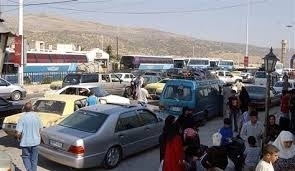With the Lebanese authorities’ decision to close the border to Syrians, the circle may be completely closed to Syrians. That step has transformed Syria into a veritable giant prison, and turned Lebanon from a border port and backyard to Syria into a high prison gate that can’t be scaled, blocking off Syrians’ other crossings to Jordan and Turkey.
For a long time, Syrians have been suffering from the journey to Beirut. Overcrowding and security barriers make their trip very difficult. And once they do pass through, they begin to suffer at the hands of Lebanese security, who have prevented many Syrians from crossing into Lebanon without justification and sometimes arbitrarily, due to political considerations, as many people confirm.
After being exposed to annoyances and insults from [Lebanese] officers, hundreds of Syrian families have been forced to return without any consideration given to the fact that being prevented from crossing into Lebanon is a real danger to their lives. Moreover, dozens of Syrian students headed to their universities or to other countries via Lebanon have been forced to return. They’re left to look for other options to leave Syria. There is also the great damage done to those who drive passengers between the two sides, some of whom have stopped working, while others have resorted to [relying upon] a few “supporting people” to carry on their affairs.
For a long time, the Lebanese government has been torn on the issues of Syrian refugees, vacillating between strictness and sympathy. But events in Arsal and the kidnapping of Lebanese soldiers strengthened those within the government with a strict attitude and weakened sympathy for the Syrian issue. This is widely reflected in the ill treatment of large groups of Syrians in many areas of Lebanon, and spreading feelings of hostility and resentment against them on a large scale, which has led to some, albeit weak, advocacy campaigns to defend Syrians.
The Lebanese government ignores the impact of such decisions on Lebanon because the security dimension was overwhelming. Therefore many other issues were not taken into account, first among them being the fact that this decision will not bring a solution to security problems in Lebanon, where more than 1.2 million Syrians who were harmed by the regime reside. Closing the border in the face of a few thousand more doesn’t seem to consider the real problem caused by Hezbollah's involvement in the fighting alongside the Syrian regime. In order to defuse the crisis, which has been almost frighteningly explosive in Tripoli, Hezbollah must be forced to return to the fold of the Lebanese state. This is especially true if Lebanon wants to stop being dragged into the Syrian quagmire—it would also stop giving Syrian refugees a reason to take issue with Lebanon.
It is true that Lebanon bears heavy burdens as a result of the flow of Syrian refugees into its territory, but it must not forget that its banks are filled with millions of dollars that flowed in from Syria. And millions more will flow in from investments in housing, real estate and other sectors, but the continued annoyance of Syrians will affect these investments sooner or later.
The continuation of its strict policy toward Syrian refugees along with the closing of the only remaining gate for Syrians shows that the Lebanese government forgets that Syria is surrounded by Lebanon—and not vice-versa—and many Syrians will be forced to get into Lebanon illegally. And with a long border of more than 250 km that cannot be controlled, such a situation will probably be a greater burden, and could be more serious.
...


